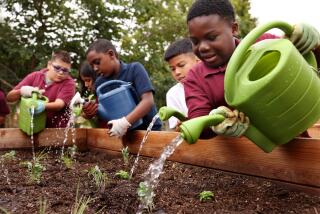Students Uncover Their Futures in Recycling
- Share via
Among the flattened cardboard boxes and blue barrels of white paper at Foothill High School’s recycling center, junior Ed Amezola has found himself.
Two years ago he was into graffiti and gangs and had been held in juvenile hall. Now the 17-year-old is a supervisor at the school’s student-run recycling center, which early next month will double in size -- and its potential for changing the lives of students like Ed.
The center was created a decade ago to provide job training and real-life business experience for learning-disabled students in the special education program at the school north of Tustin. Today, it is the state’s largest-scale recycling program of the several dozen that high school students run, according to the California Department of Education.
About 40 tons of paper, bottles, cardboard and other materials are processed each month at the patch of concrete at the back of the school that is crammed with blue and green recycling containers in various sizes.
Ed, who started working at the center last year, credits his job for turning his life around. For the last two semesters, he has earned a spot on the school’s honor roll.
“Working here has given me a reason to be good,” he said on a recent afternoon as he eyed three student workers sorting through a dumpster.
The center is run just like a company, with business officers and board meetings, so the almost-daily sorting of materials is only part of the operation.
Students get a taste of bureaucracy in the Friday morning board meetings in teacher Sean Pfaff’s classroom.
Company president Matt Jensen, a junior, advanced slowly through the agenda one recent Friday, as items provoked debate from the eight attendees.
When he rehearsed his speech for the upgraded recycling complex’s May 8 dedication, junior Jeff Dibbern argued that it centered too much on Matt.
“You talked about you a lot, and I think you should talk about the other people who work here too,” said Jeff, 17. “And you said ‘self-esteem,’ like, mass times.”
He stared stonily at Jeff then called for a vote to approve his speech. It passed.
“Dealing with employees is the hardest part of this job,” Matt said after class, adding he doesn’t plan to change his speech. “I have a really bad temper, but I’ve learned I have to take it down a notch if I’m also going to be a leader later in life.”
Although some of the dozen students who work at the recycling center are special education students, others are not. Mixing the students is intended to dissolve the stigma of Pfaff’s class, he said.
“We want to break down the barriers of what people think special education kids are capable of doing,” Pfaff said.
Senior Drue Clark, the company’s vice president, said holding a leadership position has opened up possibilities he never thought a special education student could have.
A former defensive tackle on the football team, the 17-year-old has advanced from his first job, taking inventory of incoming materials. The experience, he said, has taught him organizational skills and how to budget his time.
“Before, all I cared about was football and getting that 2.0 [grade-point average] to play,” he said. “I didn’t think there was anything else I’d be able to do. Now I’ve learned that I don’t need football to be a successful person.”
The improved site will include a sophisticated sorting machine and a security system to protect confidential documents coming from companies that hire the center to do their shredding. A fence circling the 5,600-square-foot facility already has been added.
The $85,000-expansion has been funded mostly through donations, including a $10,000 contribution from Irvine-based New Century Mortgage. The company had been sending its recyclables to the center for several years.
Ed Gotschall, New Century’s chief financial officer, said the center teaches lessons in self-confidence that aren’t emphasized enough in the classroom. “That these kids are getting practical knowledge of how to operate a business and how to relate to people is invaluable,” he said.
Students on the center’s board are eligible to earn stock that they can redeem for gift certificates or class privileges -- like playing video games -- since it is illegal for students to earn money for attending a class.
The student operators, since all work is done after school, earn minimum wage.
During a recent 2-hour shift, student supervisor Ed constantly circled the half-dozen workers -- sorting paper or smashing cardboard boxes, but mostly watching to ensure no mistakes were made and work areas stayed neat. Ed’s position has given him responsibilities he never imagined he could handle, he said.
“I made bad choices before because I was trying to feel important,” he said. “Now I really am someone, and to know I earned that is a really good feeling.”
More to Read
Sign up for Essential California
The most important California stories and recommendations in your inbox every morning.
You may occasionally receive promotional content from the Los Angeles Times.













